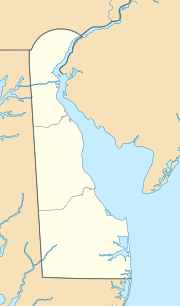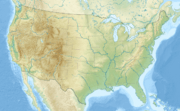Gum Branch (Nanticoke River tributary) facts for kids
Quick facts for kids Gum Branch |
|
|---|---|
|
Location of Gum Branch mouth
|
|
| Other name(s) | Tributary to Nanticoke River |
| Country | United States |
| State | Delaware |
| County | Sussex |
| Physical characteristics | |
| Main source | divide between Gum Branch and Johnson Branch (Mispillion River) about 3 miles northwest of Ellendale, Delaware 55 ft (17 m) 38°50′04″N 075°29′08″W / 38.83444°N 75.48556°W |
| River mouth | Nanticoke River about 1 mile northwest of Coverdale Crossroads, Delaware 20 ft (6.1 m) 38°43′48″N 075°33′40″W / 38.73000°N 75.56111°W |
| Length | 9.72 mi (15.64 km) |
| Basin features | |
| Progression | southwest |
| River system | Nanticoke River |
| Basin size | 37.35 square miles (96.7 km2) |
| Tributaries | |
Gum Branch is a small but important waterway located in Sussex County, Delaware. It flows for about 9.72 mi (15.64 km), which is nearly 10 miles! This stream is a tributary to the Nanticoke River, meaning it's a smaller stream that flows into a larger one. Think of it like a smaller road joining a main highway. Gum Branch is one of the main tributaries that feed into the Nanticoke River in Delaware, alongside other streams like Deep Creek, Gravelly Branch, and Broad Creek.
Contents
Where Does Gum Branch Flow?
Gum Branch starts its journey in Delaware, a state in the United States. Specifically, it's found in Sussex County.
The Beginning: Source of Gum Branch
The source of a river or stream is where it begins. For Gum Branch, its source is located about 3 miles (or 4.8 kilometers) northwest of a town called Ellendale, Delaware. This starting point is quite high up, at an elevation of about 55 ft (17 m) (or 17 meters) above sea level. It's near a natural divide, which is like a small ridge that separates where water flows into Gum Branch versus another stream called Johnson Branch.
The End: Mouth of Gum Branch
The mouth of a river is where it ends, usually by flowing into a larger body of water. Gum Branch flows into the Nanticoke River. This meeting point is about 1 mile (or 1.6 kilometers) northwest of a place called Coverdale Crossroads, Delaware. At its mouth, Gum Branch is much lower in elevation, only about 20 ft (6.1 m) (or 6.1 meters) above sea level.
Flowing Southwest
As Gum Branch travels from its source to its mouth, it generally flows in a southwest direction. This means the water moves from the northeast part of Sussex County towards the southwest.
The River System and Its Helpers
Gum Branch is part of a larger river system, which is like a family of connected waterways. Its main family is the Nanticoke River system.
What is a Drainage Basin?
Every river or stream has a drainage basin (also called a watershed). This is the entire area of land where all the rain and snowmelt eventually drain into that specific river or stream. For Gum Branch, its drainage basin covers an area of about 37.35 square miles (96.7 km2) (or 96.7 square kilometers). This means all the water that falls within this area will eventually make its way into Gum Branch.
Tributaries: Gum Branch's Helper Streams
Just like Gum Branch is a tributary to the Nanticoke River, Gum Branch also has its own smaller helper streams that flow into it. These are its tributaries. They add more water to Gum Branch as it flows along.
- On the left side (if you're looking downstream), Gum Branch receives water from:
- On the right side, it gets water from:
Why is Gum Branch Important?
Even though Gum Branch is not a huge river, it plays an important role in the local environment. It helps carry water from the land into the larger Nanticoke River. This process is vital for the health of the entire river system and the plants and animals that live there. The average amount of water flowing out of Gum Branch into the Nanticoke River is about 37.35 cu ft/s (1.058 m3/s) (or 1.06 cubic meters per second). This steady flow helps keep the ecosystem balanced.
 | Precious Adams |
 | Lauren Anderson |
 | Janet Collins |



